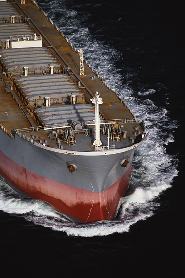

New - July 2014 For news and science on ocean topics since 2008, visit AEInews.org and either choose a Category (list on right side of page), or do a search for a word or topic of interest. Ocean Issues Introduction The world's oceans represent our planet's largest potential wild realm–there are still many areas of the deep ocean that have never been seen, explored, or fully mapped by humans. Yet our boat traffic, military surveillance technology, industrial survey techniques, and offshore energy-related development have created a vast web of sound that has made the human presence known throughout the seas.
Complicating the situation is the relative variability in the ways that sound travels and dissipates in underwater environments. While it is true that sound often carries far further in water than in air, variations in temperature, seafloor geography, salinity, ocean depth, and frequency of the sound all can create vast differences in how far sounds travel and how loud they are when they are received. Moreover, the "natural" sounds of the ocean (especially rain, storm-tossed waves, and many species' calls) are also quite loud at times, raising uncertainty about how human noise is different, and how well-adapted ocean creatures may be to extreme sound. Beginning in the late 1990's, fears mounted after some unexpected whale beachings, in which the animals seemed to have suffered some sort of physical trauma causing hemorraging of internal organs, and which researchers identified as likely triggered by acoustic impacts (either changes in dive patterns, or direct exposure to loud sound). Other recent research has shown that fish can suffer short- or long-term hearing damage after exposure to sounds in the range generated by seismic survey air guns and new navy sonars, though the effects are caused by much longer exposure at close range than fish are likely to experience in the wild. In the wake of these findings, and of governmental reports and court orders that pointed toward the dangers of intense sound on ocean life, several reports emerged in 2002 and 2003 calling for more intensive research and public education into the extent and effects of human-made noise in the oceans. This section of the AEI website aims to offer an overview of various sorts of sounds that are of concern, as well as a primer on the physics of ocean acoustics. It also offers links to key ocean noise reports that have been released over the past several years. Our hope is that through bringing together a wide range of available knowledge, we may contribute to a richer, more informed dialogue between the public, academia, and governmental agencies. For more detailed coverage of ocean noise issues, our lay summaries of new scientific research and several ocean-oriented special reports (designed to be readable in 10-15 minutes) will take you much deeper in specific directions: Recent Science Research AEI Special Reports Naval Active Sonars AEI Spotlight Reports AEI FactCheck: Navy/NRDC Sonar Debate Ocean Noise 2008: Science, Regulatory, and Legal Developments Ocean Noise: What We Learned in 2007 Marine Mammal Commission Advisory Committee on Acoustic Impacts Ocean Noise: What We Learned in 2006 International Whaling Commission 2008 Meeting International Whaling Commission 2006 Meeting International Whaling Commission 2004 Meeting |
| © AcousticEcology.org, 2008 | Privacy Policy | Site Map |
